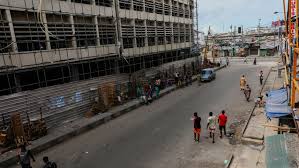Nigeria’s 36 states and the Federal Capital Territory (FCT) have banned inter-state travels and placed total restrictions on movements, a lockdown caused by spiralling cases of coronavirus.
The states and the federal government are worried as the country’s total infections rose 1,095 as at April 24, with 32 deaths and 208 discharged.
In spite of the efforts to contain the spread of the pandemic by the central government, the virus is spreading like wildfire, reaching virtually all the states.
Mr Boss Mustapha, the Secretary to the government of the federation, reported in his daily briefing the astronomical rise was an indication of community spread.
“We must all arise to fight this potent and invisible common enemy by adhering to the guidelines and protocols for COVID-19, which includes personal hygiene, social distancing, wear of masks in public places, obeying the stay-at-home order and reporting unusual illness to the authorities for investigation,” Mustapha said.
Considering the dynamic nature of the response plan, the strategy for testing he said had been modified and door-to-door tests were now taking place.
He thanked the Sultan of Sokoto and president-general of the Nigerian Supreme Council for Islamic Affairs for stopping congregational prayers during Ramadan which started on April 24, 2020.
The Sultan, he also noted, directed the suspension of obligatory religious activities such as Jumaat, congregational and other sessions during the month of Ramadan.
This is in line with decision of Christian bodies to also suspend congregational service.
In a “painful’’ measure released on April 22, 2020, Nigerian governors “unanimously” agreed on the implementation of an inter-state lockdown.
Under the platform of the Nigeria Governors’ Forum (NGF), the governors took the decision after being briefed by their counterparts in Lagos, Bauchi, Oyo and Ogun States.
They agreed on the decentralisation of the fight against the virus to stop its spread.
As the lockdown bites harder on small scale and petty businesses, many Nigerians, especially women have switched to selling foodstuff.
Mrs Cecelia Ude, a dealer in baby wears said she has started selling garri (cassava flake) and palm oil, which are more in demand than non-food items.
“In fact, nobody told me to start foodstuff business as hunger was about to set into my home. I am happy doing this garri and palm oil business because it was almost difficult for me to feed my four children,’’ she said.
Miss Chioma Okoye, a dealer in kitchen utensils at Garki market in Abuja, said she has resorted to selling dried fish and crayfish.
She went into the foodstuff business so as not to lock up her shop and remain at home spending the little money she had.
Fashion designer, Mrs Uju Nebo, said she started selling sweet potatoes and breadfruit outside her compound to assist her husband financially.
The implementation of the lockdown by security operatives had been total but some Nigerians feel it should not be high-handed.
Mr Morakinyo Ogele, a human rights lawyer, appealed to the governments to quickly address the issue of police and military brutality.
Ogele said the enforcement of the lockdown had turned bloody, aside from the extortion by police and soldiers.
Some Nigerians, including economists are seeking the gradual unlocking of sectors.
Dr Boniface Chizea, an economist on Saturday urged the federal government to consider the gradual unlocking of some sectors of the economy.
Chizea, the Managing Director of BIC Consultancy Services, said gradual unlocking of the economy would prevent desperation, and irrational and anti-social actions by citizens.
He noted that the lockdown was necessary, but urged for a gradual easing to save the economy and allow more farmers to go back to their farms.
“We need to ensure we do not miss the planting season; otherwise, we would be inviting hunger’’ he appealed.
MM/as/APA


